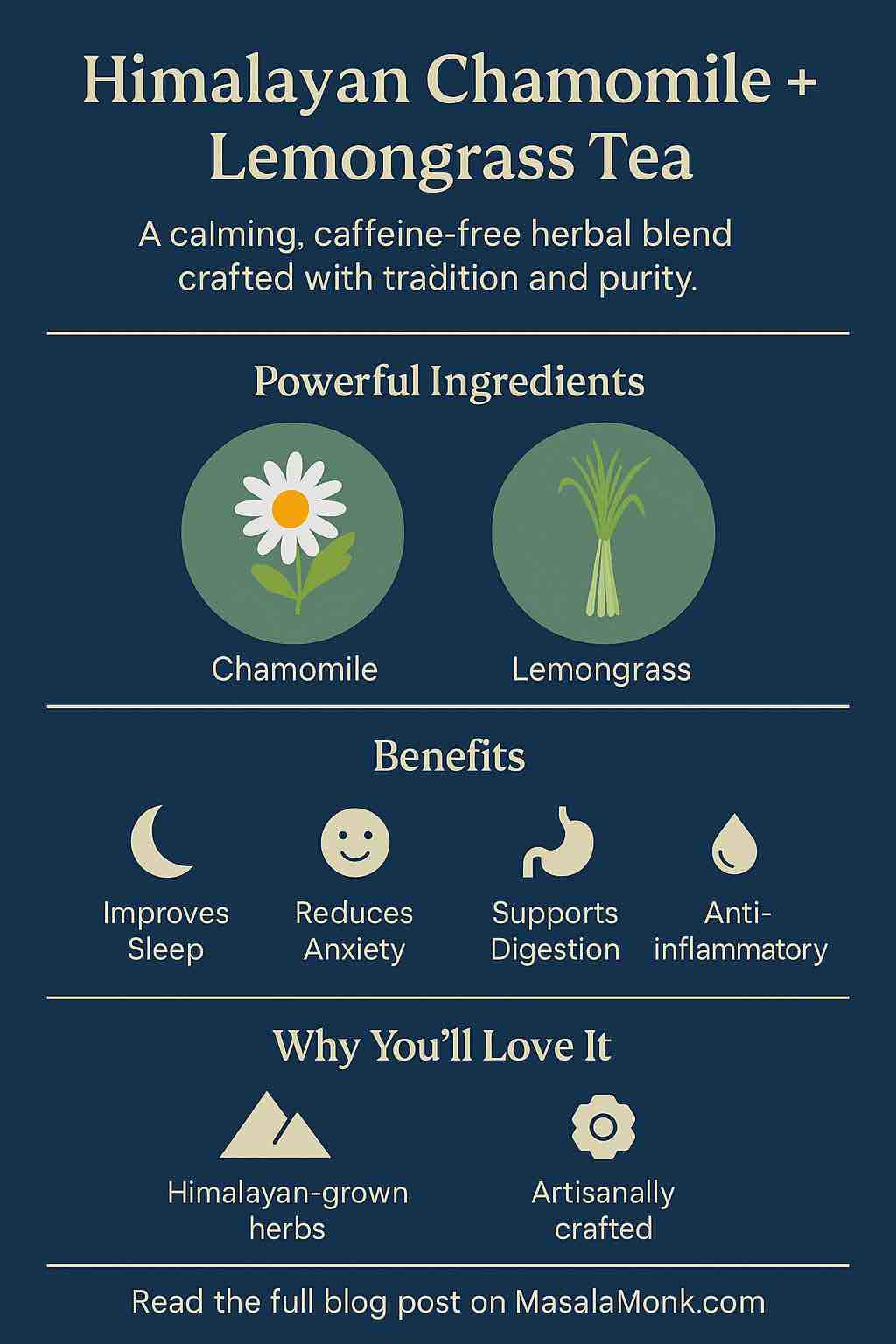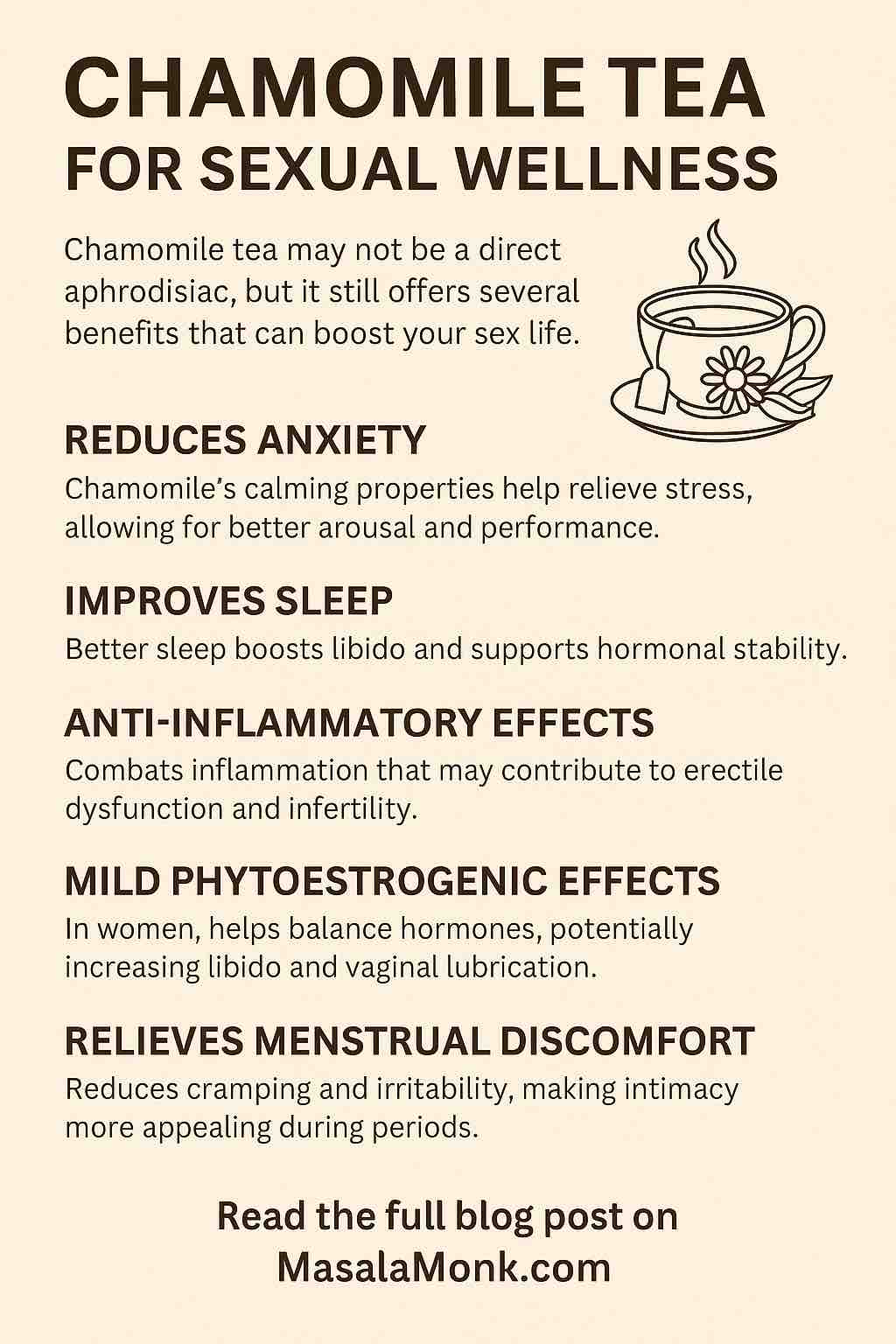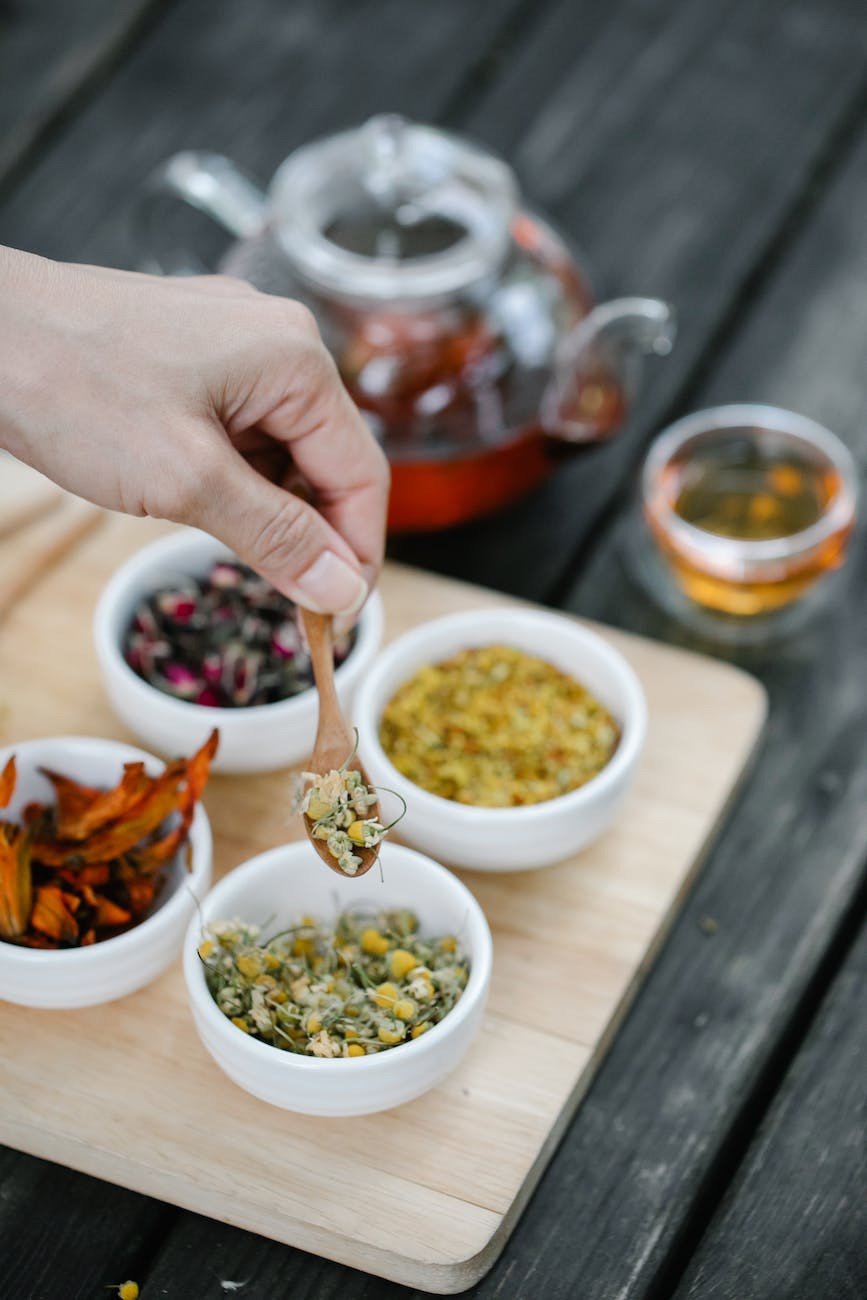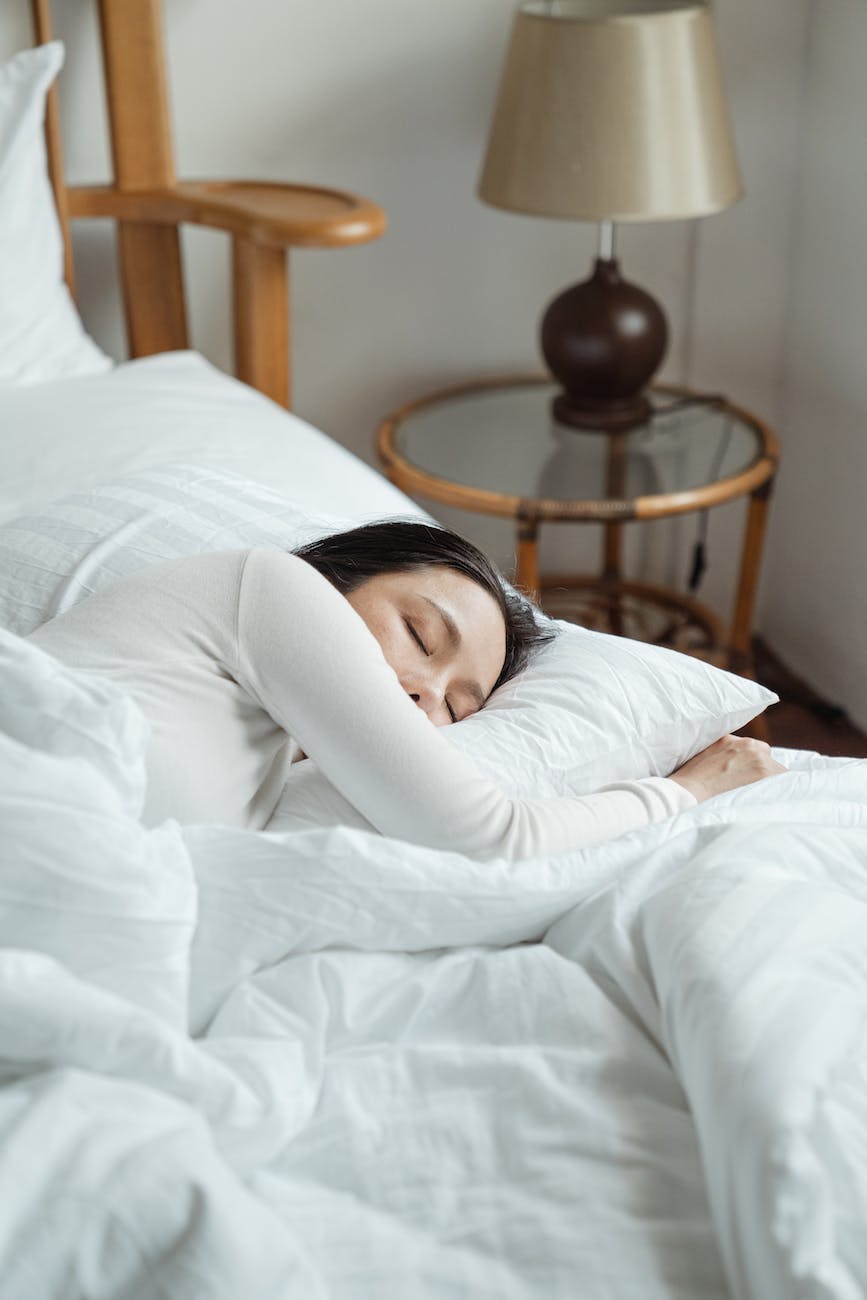
In a world driven by deadlines, screens, and overstimulation, what if the key to inner balance was as simple as a cup of tea?
We’re talking about a blend that’s more than just comforting—it’s therapeutic. A tea that combines the gentle calm of Himalayan chamomile with the refreshing clarity of lemongrass, both known for centuries in traditional medicine and now increasingly supported by science.
Now available on MasalaMonk.com, this herbal infusion is crafted by small-batch artisans and herbal growers rooted in India’s Himalayan regions. Thoughtfully curated and listed on MasalaMonk — a marketplace known for exotic, regionally sourced wellness products — this tea delivers both purity and purpose, one soothing sip at a time.
Let’s dive into what makes this blend so unique, so effective, and so needed in today’s fast-paced world.
🌿 Why Choose Chamomile + Lemongrass?
This blend brings together two time-honored herbs, each revered for its gentle yet effective health benefits:
🌼 Chamomile – The Flower of Calm
Used for centuries in Ayurveda, Traditional European Medicine, and folk practices around the world, chamomile is more than just a sleepy-time tea.
Backed by modern research, chamomile is known to:
- Promote deeper, more restful sleep
- Reduce stress and anxiety naturally (via the flavonoid apigenin)
- Ease digestive discomfort, including bloating, gas, and mild cramps
- Provide mild anti-inflammatory and antioxidant effects
- Calm the skin and support oral health when consumed regularly
📚 2024 research published in Clinical Nutrition Research confirms chamomile’s effectiveness in improving sleep latency, reducing generalized anxiety symptoms, and supporting mood regulation.
🍋 Lemongrass – The Herbal Cleanser
A fragrant grass widely used in Southeast Asian cuisine and herbal medicine, lemongrass adds brightness to the blend — not just in taste but in function.
Scientific studies and traditional knowledge agree that lemongrass can:
- Help detoxify the body and reduce water retention
- Improve digestion and relieve indigestion
- Support metabolic health and blood circulation
- Deliver strong antimicrobial and anti-inflammatory effects
- Calm the nervous system and promote mental clarity
🧪 Recent studies show lemongrass tea may help lower systolic blood pressure, reduce stress markers, and aid in balancing lipid profiles and gut health.
🏔️ What Makes This Tea Special?
Unlike mass-produced commercial blends, this tea is:
- ✅ Sourced from the Himalayas, where herbs grow in clean, high-altitude soil
- ✅ Sun-dried and hand-processed, retaining maximum aroma and essential oils
- ✅ Free from additives, preservatives, or artificial flavorings
- ✅ Caffeine-free, making it ideal for both day and night use
- ✅ Small-batch made, curated by artisans, and brought to you via MasalaMonk
This is not just tea — it’s a calming ritual, rooted in nature and brought to life with intention.
🌄 Why “Himalayan” Matters
Ingredients grown in the Himalayan region offer two distinct advantages:
- Cleaner Soil and Air – The high-altitude environment has lower pollution, pesticide, and industrial exposure.
- Nutrient Density – The slower growth cycle and mineral-rich soil contribute to higher levels of active plant compounds.
This isn’t a mass-market herbal tea. This is a hand-harvested, small-batch blend grown where traditional farming still honors the land.
🛏️ Who Should Try It?
This tea is perfect for:
- ✨ Professionals battling screen stress and sleep trouble
- 💚 Anyone with bloating, gas, or indigestion issues
- 🧘♀️ Wellness seekers craving a gentle detox or anti-inflammatory remedy
- 👵 Older adults managing blood pressure or digestion naturally
- 💼 Anyone needing a mindful, caffeine-free break in the day
Whether you’re winding down after a long day, easing into a digital detox, or just seeking a cleaner tea habit — this blend supports body, mind, and mood.
🍵 Brewing Instructions
To enjoy the full benefits:
- Use 1 tsp (approx. 2g) per cup
- Pour 90–95°C hot water (not boiling)
- Cover and steep for 5–7 minutes
- Optional: add honey or ginger for a boost
- Sip mindfully — no rush, no screens
📌 Best taken:
- In the evening to support deeper sleep
- After meals to soothe digestion
- Midday for a clean, calming break
🧠 The Science Behind the Calm
Both chamomile and lemongrass contain compounds that influence GABA receptors in the brain — helping calm the nervous system without causing drowsiness or dependence.
Together, they:
- Modulate cortisol levels (stress hormone)
- Improve parasympathetic activity (rest & digest state)
- Support gut-brain communication via the vagus nerve
So it’s not just about flavor — this tea works from the inside out, harmonizing multiple body systems with every sip.
🛒 Ready to Sip Smarter?
Your body deserves better than just caffeine and sugar-loaded drinks.
Choose a calming ritual rooted in Himalayan purity and herbal wisdom.
👉 Order now from MasalaMonk:
https://masalamonk.com/product/himalayan-chamomile-lemongrass/
✅ Quick Recap: Why You’ll Love This Tea
| Feature | Benefit |
|---|---|
| Chamomile + Lemongrass | Calms nerves, aids sleep, supports gut |
| Himalayan-grown herbs | Clean, potent, rich in nutrients |
| No caffeine, no preservatives | Safe for daily use, even at night |
| Small-batch, artisan-crafted | Authentic taste and powerful effects |
| Curated by MasalaMonk | Trusted source for exotic wellness finds |
🔚 Final Sip
There are few rituals more restorative than making yourself a cup of herbal tea — especially when that tea has been used for generations to bring peace, rest, and clarity.
With Himalayan Chamomile + Lemongrass Tea, you’re not just hydrating —
You’re rebalancing, refocusing, and reconnecting.
Let this blend become your daily anchor.
You deserve that kind of calm.
☕ Practical Benefits of Daily Use
Here’s how one simple habit—sipping this tea—can improve your quality of life:
| Benefit | What It Supports | Backed By |
|---|---|---|
| Better Sleep | Fall asleep faster, sleep deeper | Chamomile + Lemongrass (2024 meta-analyses) |
| Stress & Anxiety Relief | Calms the nervous system naturally | Apigenin & citral effects on GABA & cortisol levels |
| Digestive Support | Eases bloating, cramping, and indigestion | Traditional use + clinical trials |
| Immune Boost | Rich in antioxidants & mild antimicrobials | Lab-based antimicrobial studies |
| Hormonal Balance | Supports adrenal and thyroid pathways (indirect via stress reduction) | Herbalist consensus + preliminary animal studies |
| Anti-inflammatory Effects | Helps manage systemic inflammation | Polyphenol-rich profile of both herbs |
✅ FAQs: Himalayan Chamomile + Lemongrass Tea
- What are the main benefits of Himalayan Chamomile + Lemongrass Tea?
This tea promotes better sleep, reduces anxiety, supports digestion, helps reduce bloating, and delivers anti-inflammatory and antioxidant benefits. It’s a gentle, daily wellness blend suitable for all ages. - Is this tea caffeine-free?
Yes, both chamomile and lemongrass are naturally caffeine-free, making it perfect for evening consumption or those avoiding stimulants. - When is the best time to drink this tea?
The tea is ideal after meals to aid digestion or before bedtime to promote relaxation and better sleep. - Can I drink this tea every day?
Absolutely. It’s gentle enough for daily use. In fact, regular consumption is recommended for the full benefits of stress relief and digestive support. - Where are the ingredients sourced from?
The chamomile and lemongrass are grown in the Himalayan region, where the clean air, mineral-rich soil, and high-altitude environment enhance purity and potency. - Is this tea safe during pregnancy or breastfeeding?
Chamomile and lemongrass are generally considered safe in small dietary amounts, but pregnant or breastfeeding individuals should consult their healthcare provider before use. - Does this tea help with bloating or indigestion?
Yes. Both herbs are known to soothe the digestive tract. Lemongrass, in particular, acts as a natural carminative and diuretic, helping relieve bloating and water retention. - Can children drink this tea?
In small amounts and without added sweeteners, this tea is typically safe for children. However, it’s always best to check with a pediatrician for young kids. - How should I store the tea to maintain its freshness?
Store it in a cool, dry place in an airtight container away from direct sunlight and moisture. A dark glass or metal container is ideal. - Who produces this tea if MasalaMonk is a marketplace?
The tea is crafted by small-batch, regional producers using traditional techniques. MasalaMonk curates and lists such high-quality, artisanal products on its platform for conscious consumers.














